This is our weekly roundup of good news from around the world. If you'd like to get this in your inbox, you can subscribe for free below.
The news is a lot right now. Israel is still reeling from the deadliest single day in its 75-year history, an indiscriminate massacre that killed over a thousand civilians in the most brutal manner imaginable. Two million people are now under siege in Gaza without food, water, medicine or power, and over a thousand are already dead. The horror of it all is compounded by the collective fear of what might yet be to come. Cynicism is easy because you're never wrong. If you keep on insisting the world is an awful place, and that it's only going to get worse, eventually a week like this comes along and proves you right.
There was talk of peace in recent months, hope that something was changing. Overnight, that's been replaced by despair, and the familiar moral darkness that seems to hang so heavily over this part of the world. In the choice between barbarism and civilisation nobody should waffle, but what the past few days have also revealed is that a lot of people will mourn for dead Israeli civilians but not dead Palestinian ones, and a lot of people will mourn for dead Palestinian civilians but not dead Israeli ones. What has happened to our collective humanity?
In times like this it feels strange to be writing a newsletter that celebrates progress. Disrespectful even. This is not a kumbaya though. Our aim isn't to say "Look over here! There's good stuff too!" Suffering isn't relative, there's no Benthamesque, cosmic scale weighing things up and pronouncing its verdict on world events. There are moments when the world feels like it hangs by a thread. This is one of them. We're feeling it intensely too, that sense of worry and fear.
This week, our goal is just to stop you from going numb. The global media is chasing ambulances right now, and at some point it's going to become too much. When you feel that, try to remember there's a big planet out there, and a lot of other stories surrounding the Israel-Gaza one. People in power on both sides want war. But they don’t speak for all. What we can do is keep showing up with our attention and our humanity. Don't switch off, stay with it. Here are some other stories that might make that easier.
Good news you didn't hear about
Global poverty reduction efforts are back on track. After three lost years due to the pandemic, the World Bank estimates that for 2023, 691 million people (or 8.6% of the global population) will be living in extreme poverty, which would represent the lowest proportion in human history. Smaller shares of the global population are projected to be below the $3.65/day and $6.85/day lines than ever before, too.
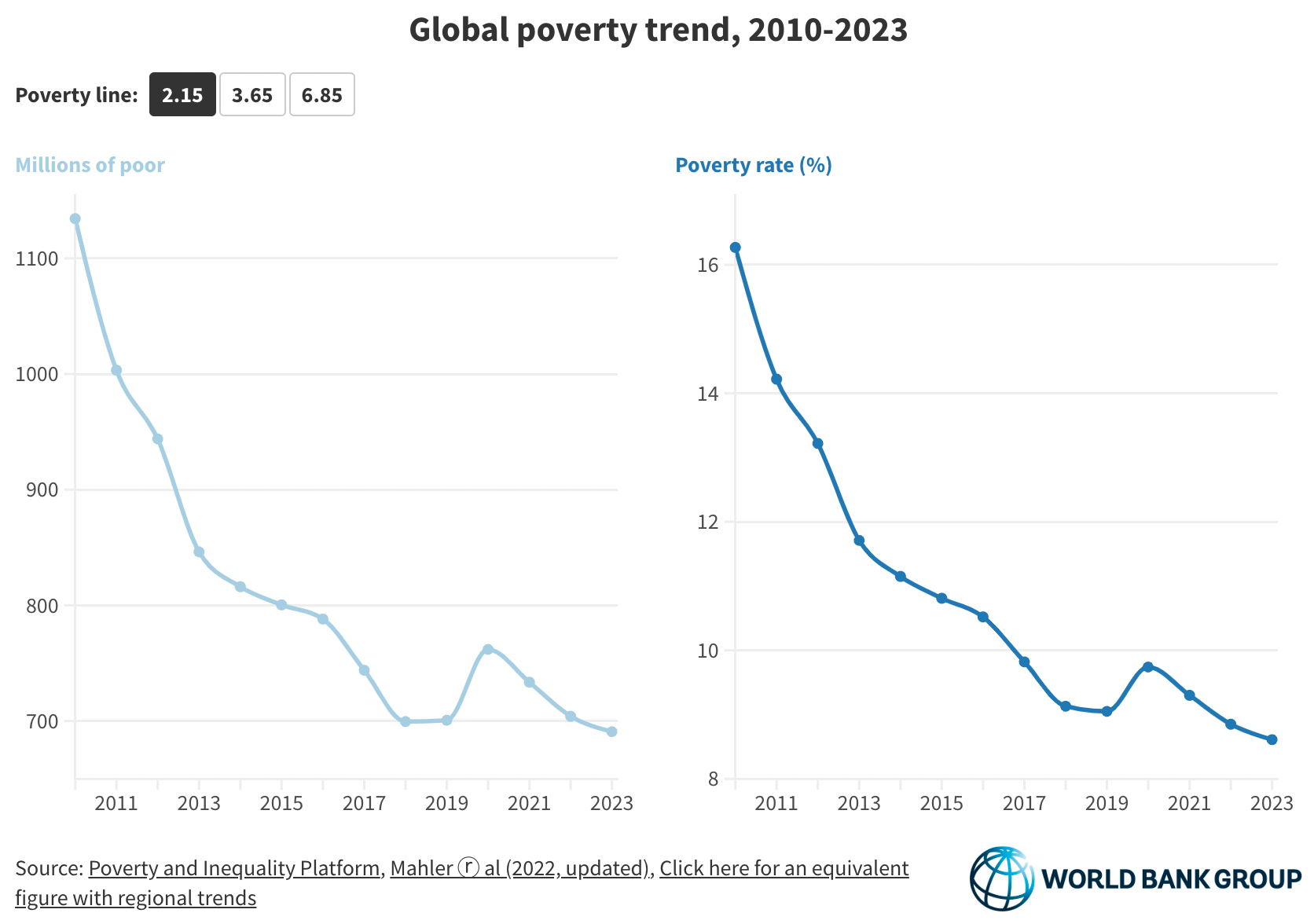
Egypt has become the first country to achieve 'gold tier' status on the path to elimination of hepatitis C. The country has diagnosed 87% of people living with the disease and provided 93% of those diagnosed with treatment. “Egypt’s journey from having one of the world’s highest rates of hepatitis C infection to being on the path to elimination in less than ten years is nothing short of astounding." WHO
The world finally has a public health tool it has been seeking for more than a century: a reliable vaccine against malaria that can protect at least two thirds of children from developing the deadly disease. The WHO just approved the cheap, effective R21 vaccine, and the world's largest vaccine maker says it's already working to make 100 million doses a year. BBC
I used to dream of the day we would have a safe and effective vaccine against malaria, now we have two.
Dr Tedros Adhanom Ghebreyesus, Director-General WHO
Johnson and Johnson is dropping its patent on Bedaquiline, a life-saving tuberculosis drug, in 134 low and middle-income countries. The decision comes after decades of public pressure to end the monopoly and will drastically increase the number of manufacturers, reducing cost and increasing accessibility. The Wire
Some really huge HPV vaccine campaigns are now under way around the world to protect women against cervical cancer. Bangladesh will vaccinate 10 million girls between 10 and 14 years old, Cambodia has added the vaccine into its national immunisation schedule, and India is aiming to vaccinate 68 million girls by 2025.
Brazil’s Supreme Court is now considering a case that could decriminalise abortion in the country up to 12 weeks of gestation. The case had been on hold since 2018. If successful, it will join the Green Wave movement along with other Latin American countries like Argentina, Colombia, and Mexico. HRW
Mauritius has joined a growing list of African countries overturning their colonial-era laws and decriminalising same-sex activity. 'This decision finally topples 185 years of state-sanctioned stigma against LGBT people in Mauritius and sends yet another important message to the remaining criminalising countries in Africa and beyond: these laws must go.' Reuters
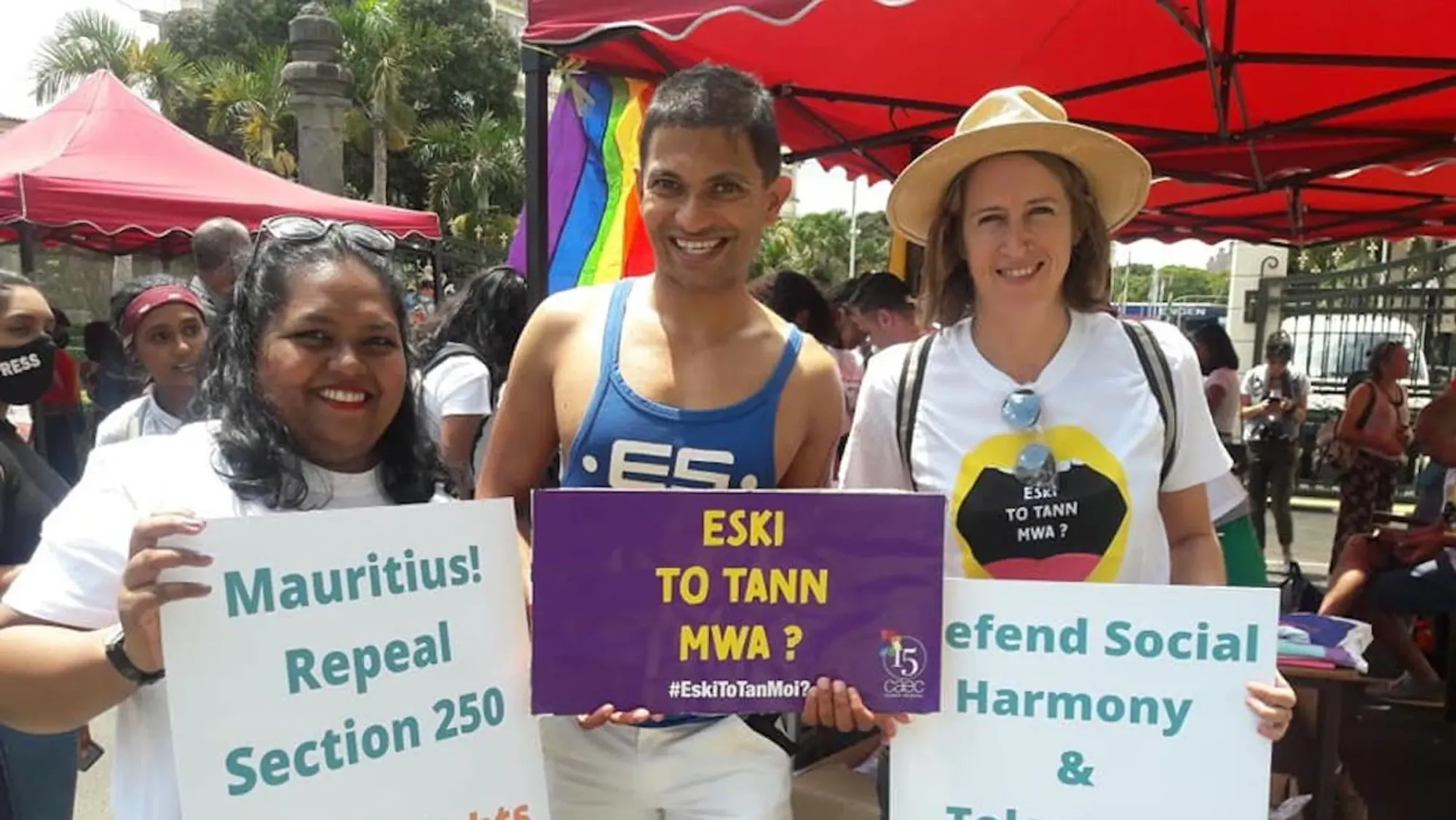
An additional 3,000 school districts have been added to America’s free school meal program, giving over five million more students access to breakfast and lunch in low-income areas. Eight states, including California, Massachusetts, and New Mexico, have now made school meals free to all students, regardless of income. PBS
Two million full-time workers in the UK will earn an extra £1,000 next year, thanks to an increase in the minimum wage to £11 per hour. It’s welcome news in the wake of rising food costs and energy bills due to the Ukraine war, Brexit, and the pandemic. Euro News
The World Bank has approved $365 million to increase girls’ and women’s access to learning, economic opportunities, and health services. The SWEDD+ project has the potential to reach over 2 million girls, aged 10 to 19 years, who are at risk of child marriage, early pregnancy, gender-based violence, and leaving school. Zawya
A historic Supreme Court ruling in Kenya has authorised the formation and registration of LGBTQIA+ organisations. The landmark victory is thanks to Eric Gitari, an attorney and activist who has fought for a decade to establish an NGO to address the abuse and violence against the LGBTQ+ community. Fair Planet
New legislation in California has banned school boards from rejecting textbooks due to race, LGBTQ+ rights, or gender identity issues. 'We’re cementing California’s role as the true freedom state: a place where families—not political fanatics—have the freedom to decide what’s right for them.' AP
Pope Francis has opened the door to Catholic blessings for same-sex couples, and in what could be another watershed moment for the Vatican, has suggested that the ordination of women to the priesthood 'could be open to further study.' NCR Online

Even more good news you didn't hear about
In Barcelona, a social movement is helping tens of thousands of kids safely cycle to school. Sexual assault survivors can now track their rape kits in 40 American states. Basic childhood immunisation rates rebounded across the world in 2022 and are almost back to pre-pandemic levels. The last year has seen some significant victories for gay rights across Asia. Senegal is tackling learning poverty by providing books for around 2 million children, alongside support to enjoy reading at home. Since 2014 the global number of cases of visceral leishmaniasis, a devastating tropical disease spread by sandfly bites, has decreased by 59%. Financial inclusion in Argentina has skyrocketed, with the number of bank accounts increasing by over 100%. Three African countries will pilot a program to boost cervical and breast cancer care. How Boston halved its high school dropout rate with a door-knocking initiative. The Biden administration has forgiven nearly $127 billion of debt for nearly 3.6 million people. A new school sport that builds robots is creating the next generation of engineers in 31 countries.
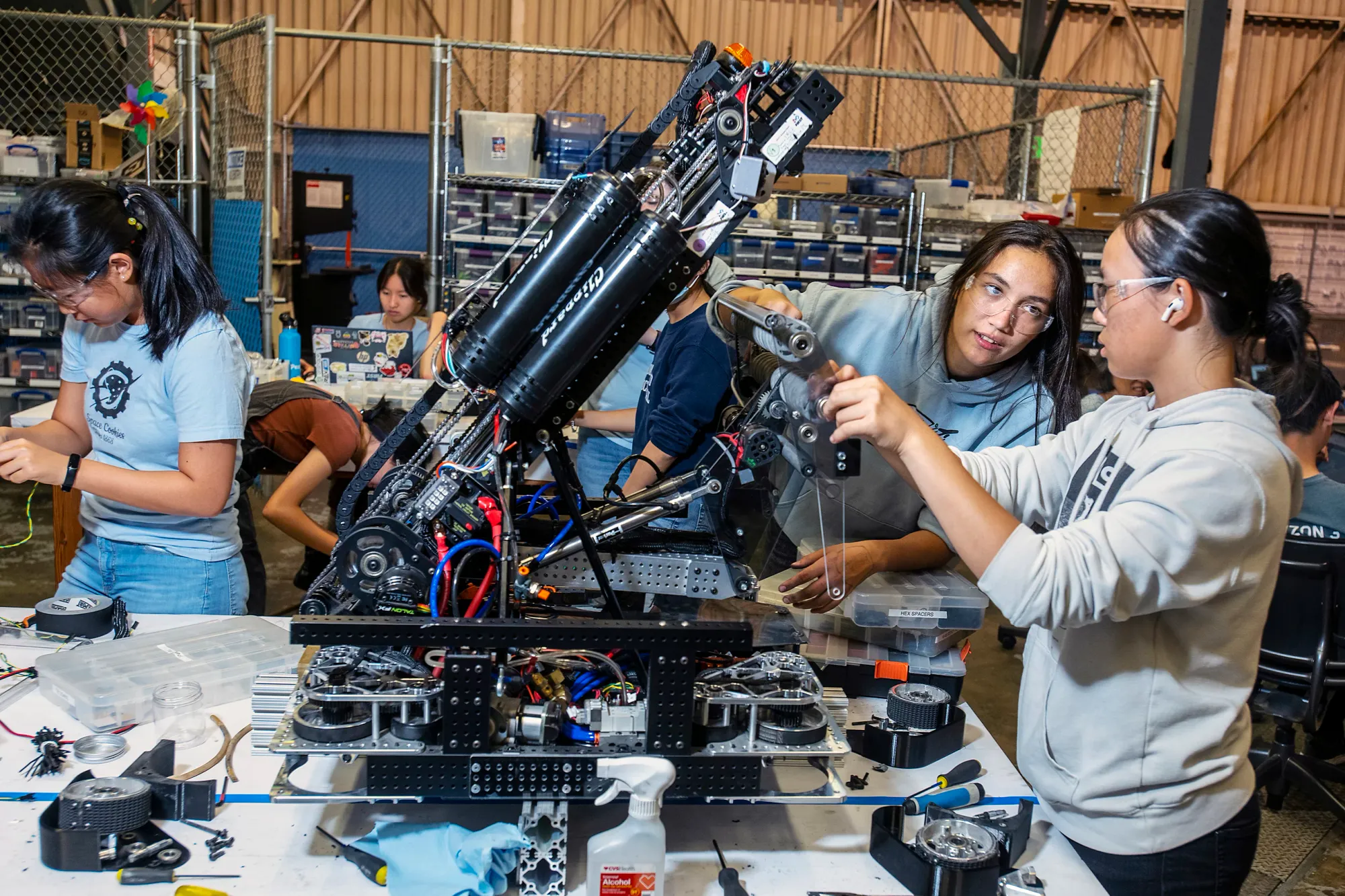
The only home we've ever known
The UN has agreed to new rules to protect people and planet from hazardous chemicals and waste. The Global Framework on Chemicals sets out 28 concrete guidelines including: phasing out highly dangerous pesticides in agriculture by 2035, better access to information about potential risks and a system for classifying and labelling chemicals. DW
Ecuador has officially established the Camino del Jaguar (“Path of the Jaguar”) Conserve to protect 213,758 hectares of the country’s most biodiverse and threatened forests. The new area is home to 1,258 species of invertebrates, 2,225 species of flora and will improve the quality of life for the 12,000 families living within its boundaries. Andes Amazon Fund
A big conservation victory in the Caribbean - Antigua and Barbados have transformed the third isle of Redonda from desolate rock to a wildlife haven for dozens of threatened species including seabirds and endemic lizards. Piloted by a local NGO, the project launched in 2016 with the removal of goats and rats, resulting in “an exponential rise in native species.” BBC
This is the largest marine protected area in the Eastern Caribbean; it showcases the amazing work that conservationists and environmentalists can do right at home.
Arica Hill, Environmental Awareness Group
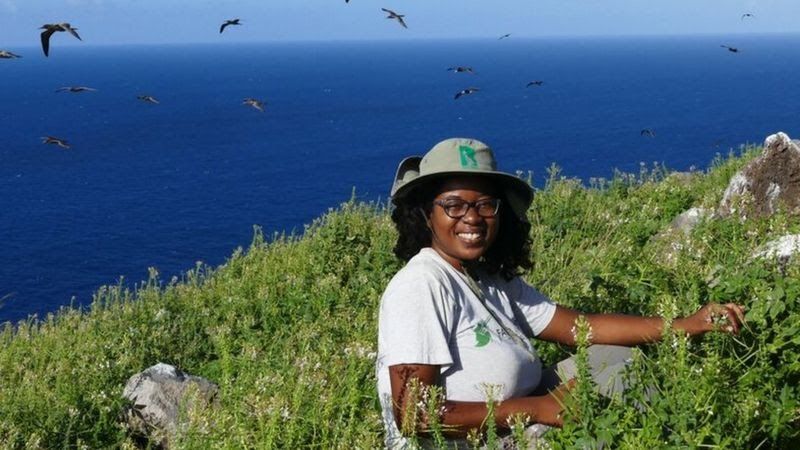
Floreana Island in the Galapagos is about to make “one of the greatest conservation interventions of all time.” After more than a decade of intensive planning, a rodent eradication project will help restore the island’s biodiversity and the populations of 54 threatened species, including the short-eared owl. Yale360
The International Coral Reef Initiative has pledged $12 billion to fund coral reef protection and to "secure the future" of 125,000 km2 of shallow-water tropical reefs. The initiative was launched in 1994 by Australia, France, Japan, Jamaica, Philippines, Sweden, Britain, and the USA and has grown to include 45 countries. Reuters
Indigenous conservation in British Columbia FTW. The remarkable Gwaii Haanas Agreement has protected over 5,000 km2 of land and ocean and has become a global model, and similar efforts in the Great Bear Rainforest have safeguarded three million hectares of temperate rainforest and revitalised local First Nations economies and communities, according to a recent report.
North America’s monarch butterfly has been upgraded from “endangered” to “vulnerable.” The surprising reversal follows a researcher’s challenge to existing population models, concluding that although the insect’s population had fallen in Mexico, it had increased in other places and overall is in fact “doing really well.” Science
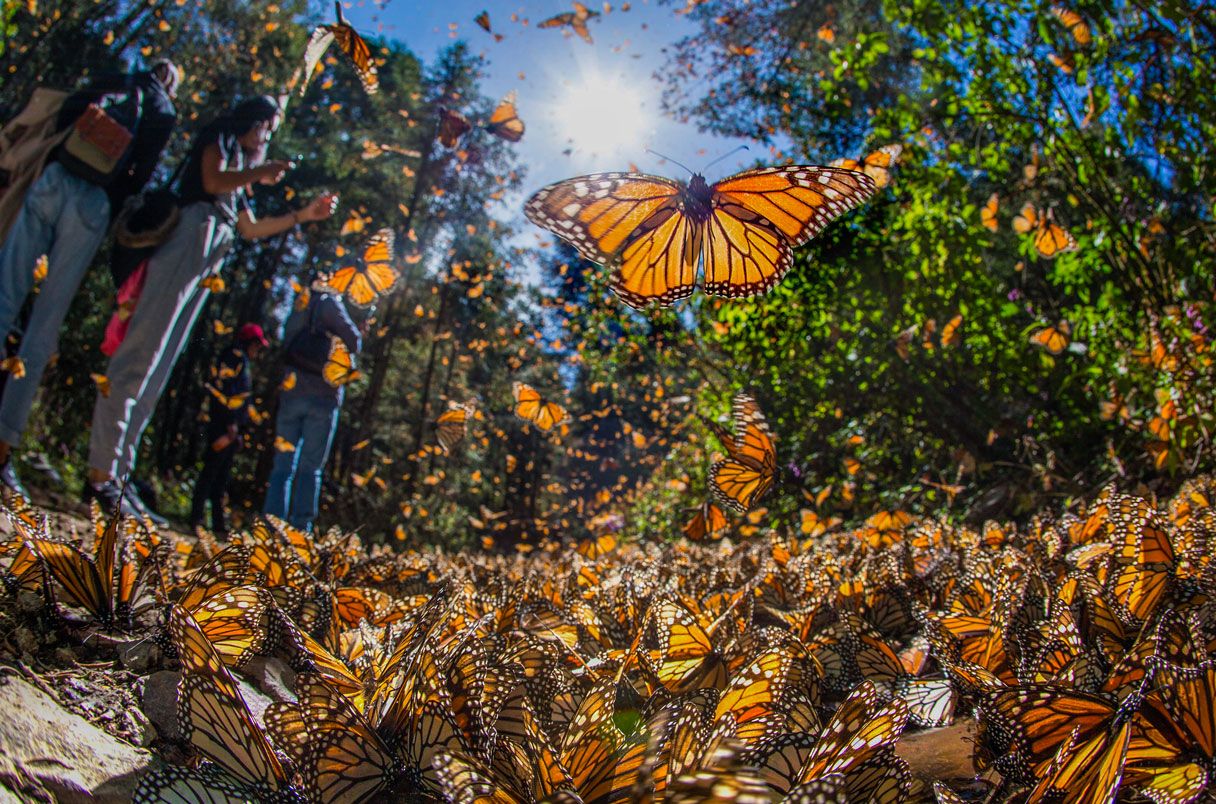
Colorado, Maine, Oregon and California have all passed producer responsibility laws requiring manufacturers to collect, recycle and manage their packaging, similar to programs that now cover paint, carpets, batteries and mattresses. More than a dozen other US states are now considering similar programs. Packworld
Gabon has taken a major step to reduce illegal logging and deforestation with a new traceability system that will track all timber products from stump to port. The system will be mandatory for all logging and wood processing companies and will utilise a combination of mobile apps, web applications, and geospatial data. Africa Insider
In 2022 the National Forest Foundation planted 8,061,125 trees in the United States, replanting an area larger than 18,500 football fields. It’s the most trees the foundation has planted in a single year, putting it on track to reach its goal of 50 million trees by the end of 2025.
England has officially banned plastic cutlery, balloon sticks, polystyrene cups and placed restrictions on single-use plastic plates, bowls, and trays, and the United States will phase out single-use plastics across 194 million hectares of public lands, including national parks and wildlife refuges within the next decade.
A few more home runs
Japanese scientists have discovered a plastic-eating bacteria that could help solve global waste. The UAE will ban single-use plastic shopping bags from January 2024. Lithuania has banned fur farming. First Nations in British Columbia must now be consulted before any mineral claims can be made in their territories. Colorado will reintroduce endangered gray wolves at the end of 2023. The Komi Memem River in Brazil has been granted personhood under a Rights of Nature law. UNESCO has added 42 new world heritage sites. China is fighting urban flooding by making its cities 'more spongey.' A billion acres of abandoned farmland around the world may play a crucial role in the planet’s salvation. Sea turtle nests in Florida have increased by 40%, after a 150 year absence, elephants have returned to Babanango in South Africa, and for the first time in 400 years a baby beaver has been born in London.
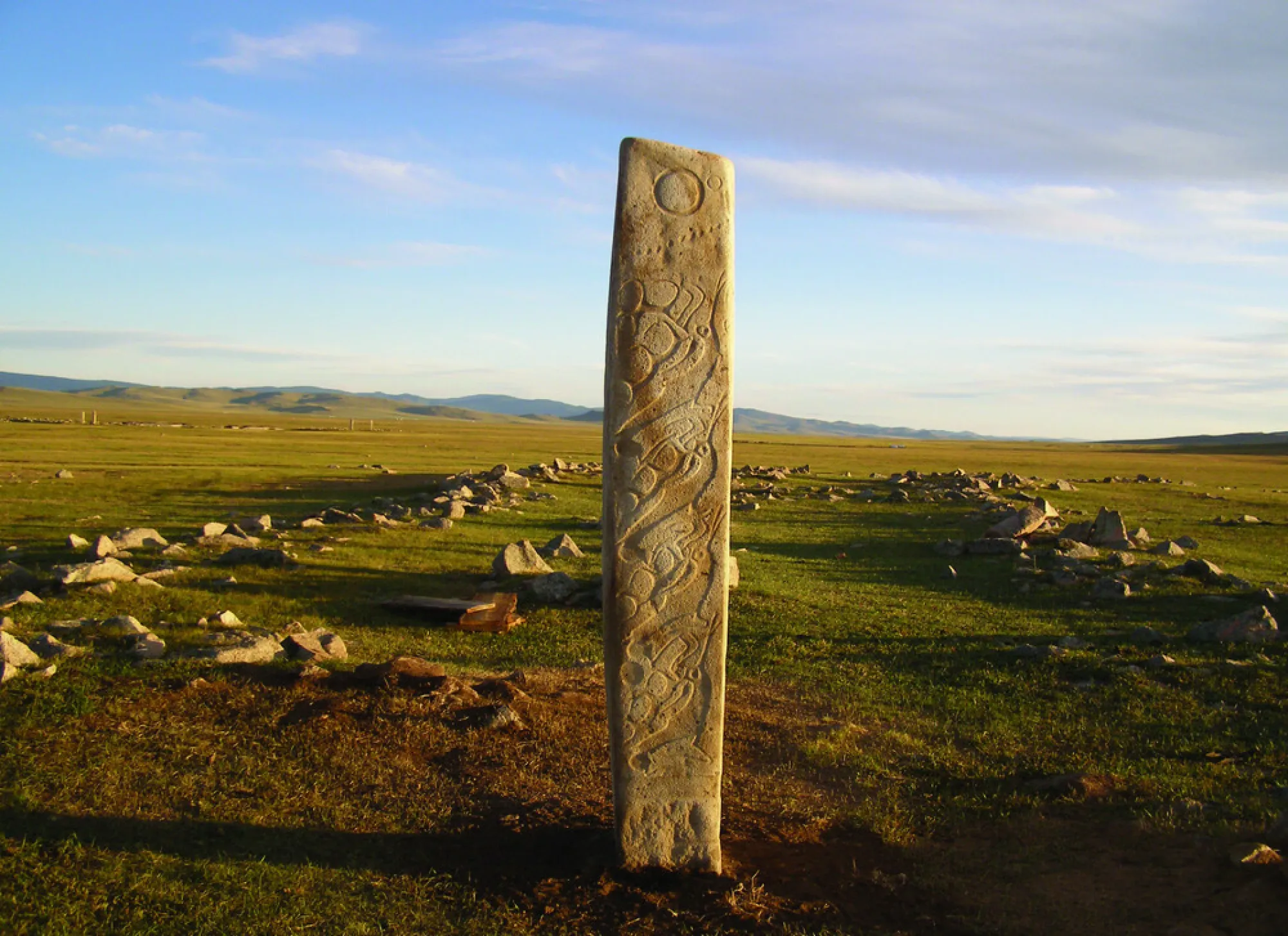
Saving the world is cheaper than ruining it
Humanity is very, very close to the point at which carbon emissions from power start falling. New data for the first half of this year show that global power-sector emissions rose by just 0.2%, thanks to a planet-spanning embrace of wind and solar. If not for severe droughts in China, emissions would have already started falling. Canary
A new climate change report offers something unique: hope. The IEA says that thanks to the extraordinary uptake of wind and solar in the last few years, there is still a path to reaching net-zero emissions by 2050 and limiting global warming to 1.5°C. That message is 'more optimistic' than the one issued in 2021. NPR
What's changed? One of the answers is that almost all previous climate models have failed to account for exponential growth of renewables. EV batteries, for example, are one of the fastest-growing mass-produced technology in history, on par with the production of US aircraft during WW2, and solar isn't far behind, trumped only by the Ford Model T.
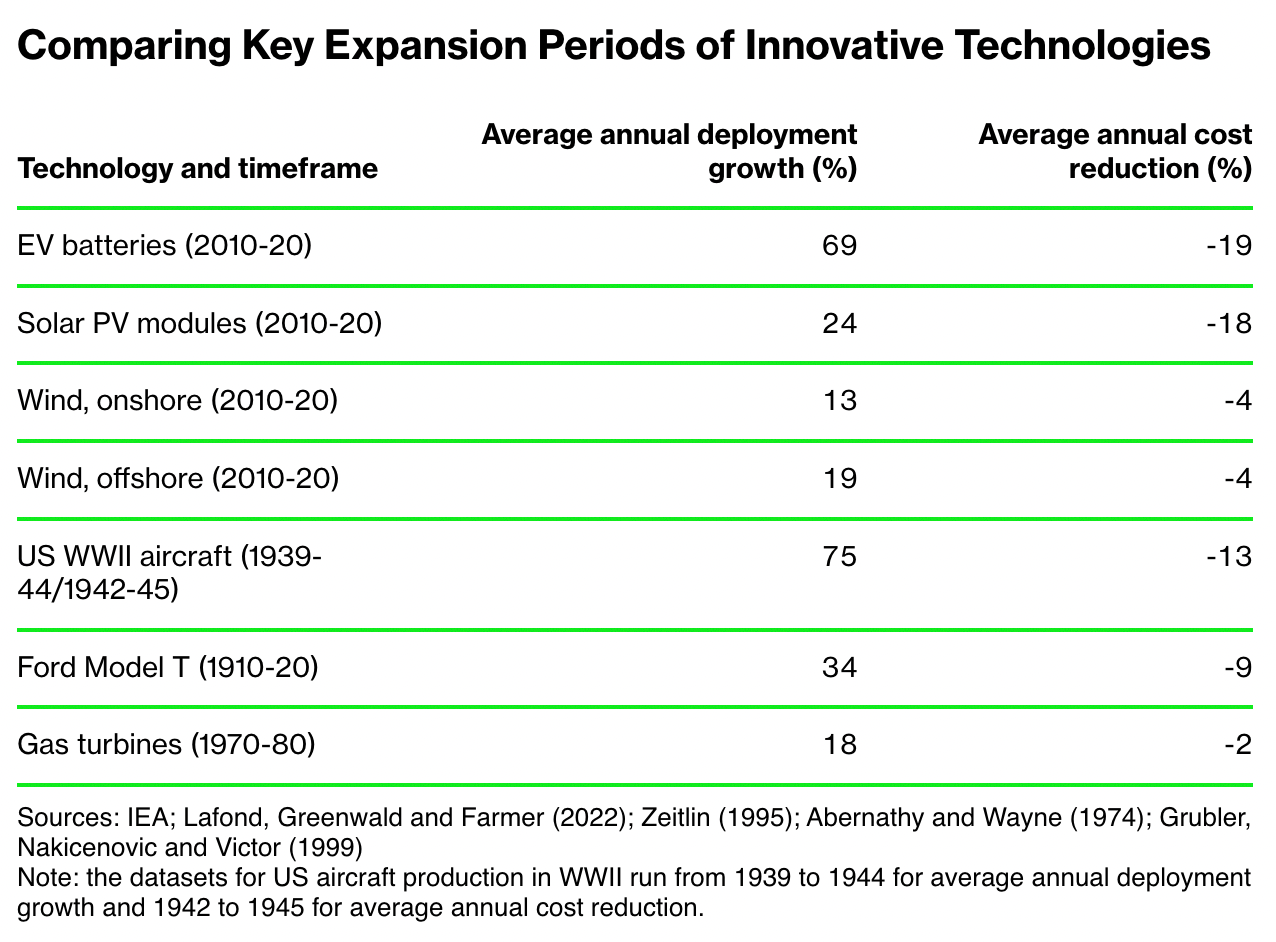
Michael Bloomberg has committed an extra $500 million to shut down every coal plant in the US and cut fossil gas capacity in half by 2030. The funding for the Beyond Carbon initiative aims to 'finish the job on coal' by working with state and local organisations to force the closure of the ~150 coal plants that have not yet retired, as well as to block the construction of new gas-fired plants. Reuters
A new cohort is forcefully pushing back on doubters who don’t think rapid utility-sector decarbonisation in the United States is feasible: the utilities themselves. Twenty-five power companies are now pushing for 80% carbon reduction by 2030, enacting ambitious, voluntary goals above and beyond any state-level mandates. Canary
Western markets and Africa will drive an annual growth rate of 10.1% for global wind power over the next decade, leading to 2,380 GW of cumulative installed capacity by the end of 2032. 'This year and next will be more challenging, but the long-term trends are still very positive for cumulative capacity growth across all regions.' Windpower
Floating wind turbines are coming. The world's largest array was switched on this year in Norway, and new projects are in the pipeline. The improved designs achieve stability by extending buoyancy horizontally, with chains and anchors in the seabed to prevent spinning or drifting. This deep dive on floating wind is the best thing we've ever ever read on the topic. Spectrum
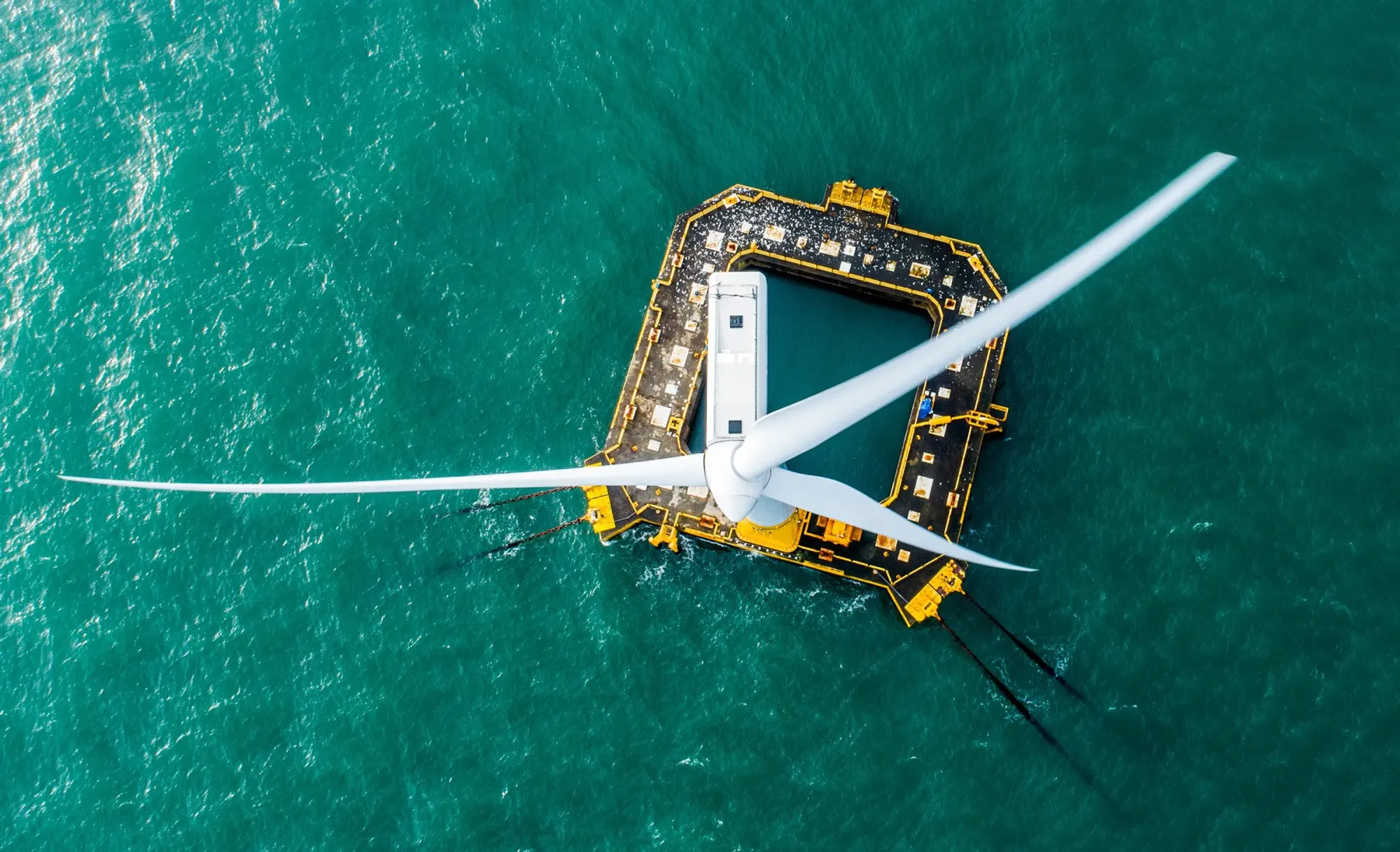
Renewables have covered more than half of Germany’s electricity consumption this year. From January through September, the amount of renewables in the electricity mix rose to around 52%—almost five percentage points higher than the same period last year. This is a big deal. Germany is the sixth-largest carbon emitter in the world. ZSW
This year is shaping up to be the take-off year for electric vehicles in the United States. Sales just passed 1 million for 2023, and projections put the end-of-year total at somewhere between 1.5 million and 1.7 million. In 2024, more EVs will be sold than in all the years between 2010 and 2022. We're off to the races now. Corey Cantor
2018: Electric cars are more expensive
2021: Electric cars are close to parity
2023: Electric cars are cheaper than cars powered by dinosaur juice in tin cans (and that's before the money you save on the dinosaur juice). Inside EVs
Approximately 270,000 new plug-in vehicles were sold in August in Europe, up 68% compared to the same month last year. Most of that momentum came from full battery electric vehicles, whose sales more than doubled year-on-year. No prizes for guessing what the top two best-selling vehicles were. Clean Technica
Everyone knows that EVs require less labour than internal combustion engine cars (one of the sticking points behind the current autoworkers strike in the United States). The only problem is that this is not true. When batteries are included, electric vehicles actually require more labour than gas-powered cars. Heatmap

After years of negotiations, the EU has adopted a comprehensive battery regulation that could spur battery recycling at a scale never seen before outside of China. Battery industry experts say the policy has the potential to supercharge lithium-ion battery recycling across the bloc. Grist
In Germany, a Dutch renovation technique called Energiesprong (literally, 'energy jump') is retrofitting old, leaky apartments to help the country meet its building decarbonisation targets. Thus far, over 5,000 Energiesprong projects have been completed in the Netherlands, and the method has spread as far as California and Canada. Bloomberg
No, electric vehicles don't emit more carbon. They do create higher emissions in the manufacturing process, and yes, they have to be charged from grids that rely on fossil fuels in many countries. However, the positive environmental impact of switching to a battery electric vehicle over its full lifetime is unmistakable. Rystad
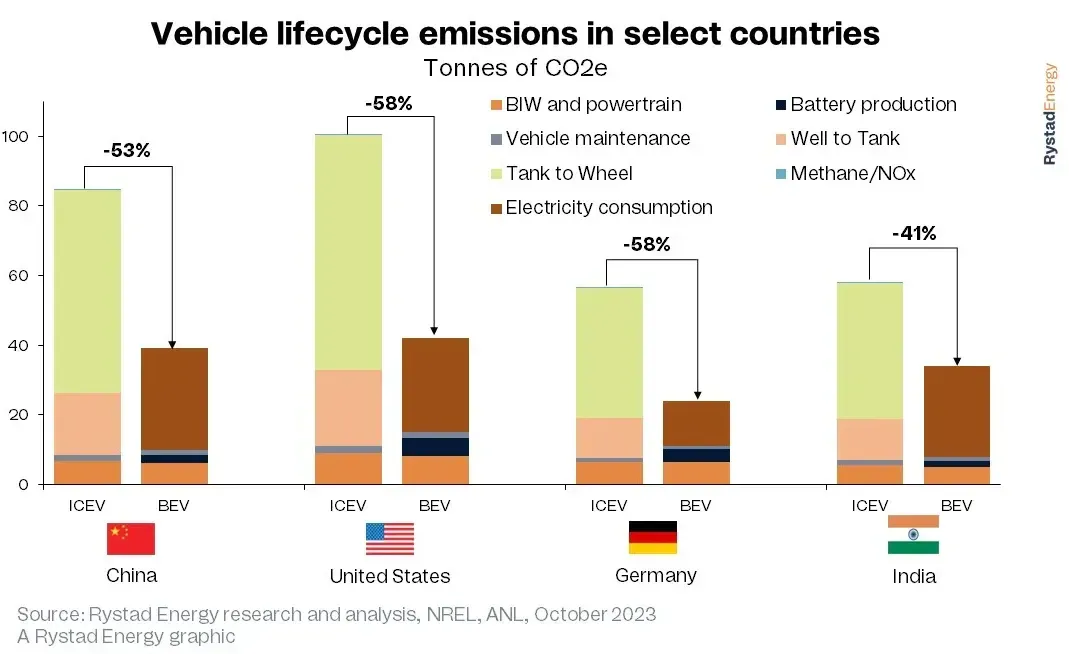
Enough with the doom-scrolling already
Did you know that the last 12 months have seen the biggest fall in solar module prices ever recorded? In Utah, construction is under way on a new kind of geothermal plant that reaches over a mile down to access a more abundant form of subterranean heat. The EU just reached a deal on slashing the use of super-potent greenhouse gases in fridges and air conditioners (the US is on it too). Facing increasing pressure from customers, multinational mining companies are switching to renewable energy. How heat pumps became a Nordic success story. Grid batteries in the United States have never been more abundant—or more useful. Norway has nearly completed its transition to electric vehicles. Electric trucks are going farther and charging faster. 'These Battery Electric Trucks Will Never Work.' Hold my 68-ton Volvo rig.

Indistinguishable from magic
Researchers have radiocarbon-dated human footprints from an ancient lakeshore in New Mexico to 23,000 years. That puts humans in the southwestern United States during the middle of the last Ice Age, 10,000 years before they were supposed to be there. 'Indigenous folks out there tell us they already knew this. We're just putting numbers on their story.' Ars Technica
The JWST has spotted an agglomeration of nearly 150 free-floating objects in the Orion Nebula, each similar in mass to Jupiter. Scientists are calling them Jupiter Mass Binary Objects, or JuMBOs, and the reason for their appearance is a complete mystery. 'There’s something wrong with either our understanding of planet formation, star formation—or both. They shouldn’t exist.' NYT
Does music move the soul? Well, it definitely moves the body. Swiss scientists analysed the physiological responses of 132 people listening to classical music and found 'clear evidence' that the music induced synchronised heart beats, physical movements, and skin conductance. The more a person felt emotionally moved, the more their heart beats were synchronised. Scientific Report. Also - Burning Man.
The robots keep getting better. At MIT, engineers have developed a long, curved touch sensor that enables them to grasp and manipulate objects; at Caltech, they've designed 'fractal fingers' that can wrap around odd shapes, inspired by a patent from 1913; and at FedEx, a two-armed, AI-powered robot is learning how to pack delivery trucks like it's playing 3D Tetris.
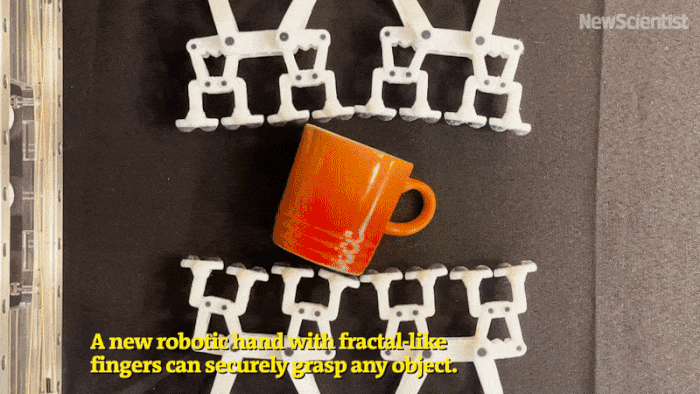
A Ukrainian materials scientist has developed a new nanotechnology 'invisibility cloak' named Phantom Skin to help protect Ukrainians from Russian drones. It's made of black plasticised material with an outer texture like a camping tarp, and it prevents the emission of heat signals by humans or military equipment, making them invisible to infrared or thermal sensors. IE
Three papers in Nature have achieved a stunning milestone, comprising the largest proteomics studies ever conducted—a field that looks at how DNA becomes proteins in the body. The first study found thousands of rare genetic variants associated with protein levels in the blood; the second compared that data cross-nationally; and the third and most important identified 14,287 genetic associations, 81% previously unknown.
Straight off the cover of a 1970s fantasy novel, this is the recently-unveiled design for a 330-meter-tall skyscraper in Saudi Arabia's planned Trojena ski resort. The area, located 50 km from the coast of the Red Sea, will apparently offer year-round outdoor skiing and adventure sports. Bring on the future (just don't ask about the carbon footprint). Dezeen
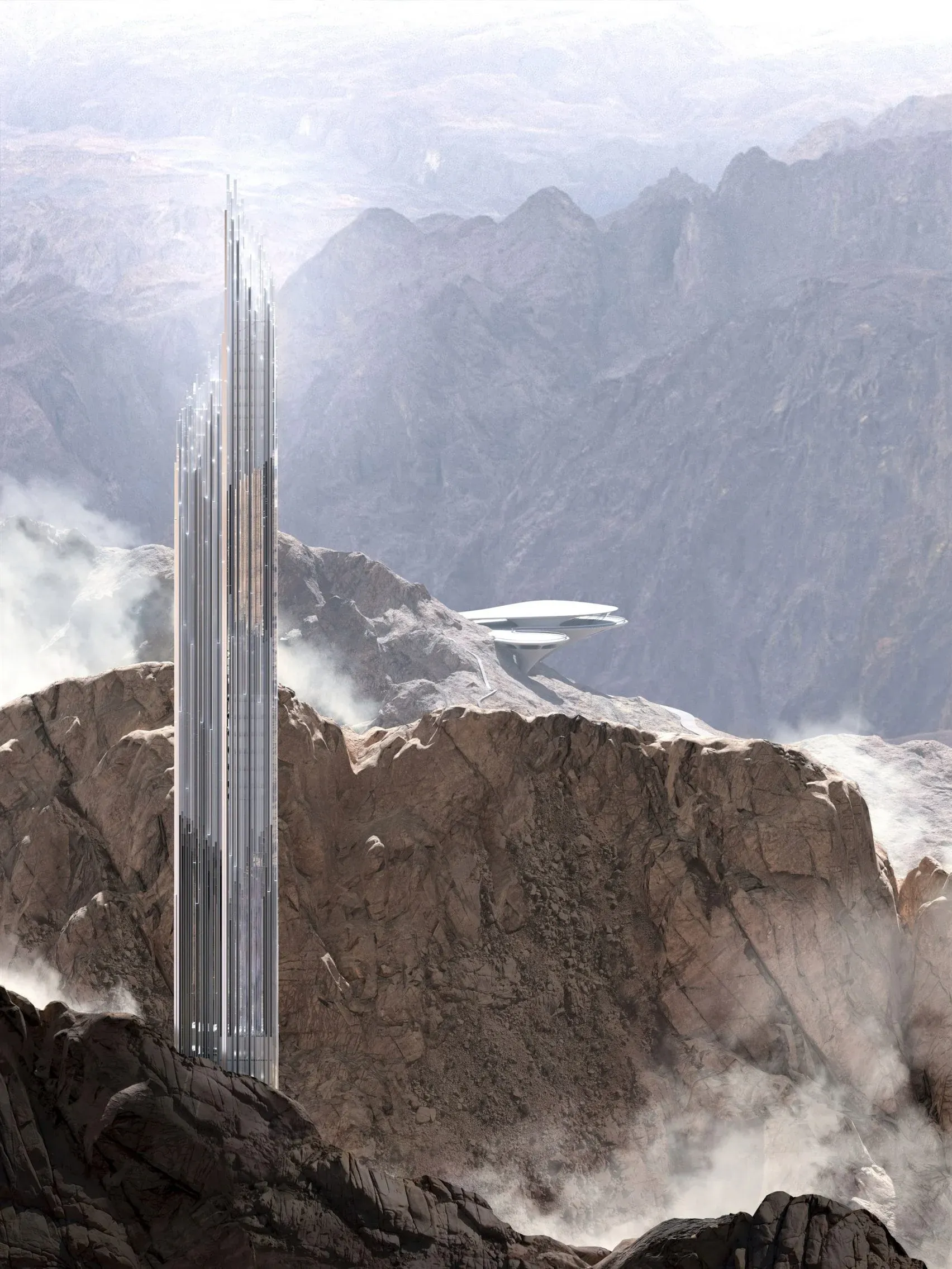
The information highway is still super
This month, an international team of researchers released the most detailed maps to date of Zealandia, the world's smallest, thinnest, and youngest continent—incorporating all five million square kilometres of this underwater region and its geology. In the process, they've uncovered hints as to how this mysterious continent formed and why it has been obscured beneath the waves for the last 25 million years. BBC
Virginia Heffernan is absolutely brilliant in this essay on what it means that an AI system called Cicero can now outcompete humans in the most human game imaginable—Diplomacy. How? By being nice. What if we aren't staring into the abyss? What if the ultimate evolutionary strategy is collaboration? 'Maybe AI that aims to seem human is best understood as a tribute act. A tribute to human neediness, caprice, bitterness, love, all the stuff we mortals do best.' Wired
Reporting from China—at least the sort that appears in Western publications—tends to ignore residents in favour of its elites or invisible-hand macro forces. Xi's latest missteps. Li Shangfu. The property market. Chips. Taiwan. Here's a much-needed alternative to that approach: Wanqing Zhang’s feature about feminism’s deepening foothold in the country. If you want to understand what’s going on somewhere, you talk to the people who live there; it’s as simple as that. Rest of World
And finally, we're finishing with some solarpunk because solarpunk. What is an ecological civilisation? Here are six ingredients, underpinned by some simple truths. 'Life runs on sunlight. Life rewards cooperation. Life builds from the bottom up. Life banks on diversity. Life recycles everything. Life builds resilience through diversity, decentralisation, and redundancy. Life optimises rather than maximises. Life selects for the good of the whole system. In short, life creates the conditions conducive to life.'

We'll see you next week.
With love,
Gus and Amy






